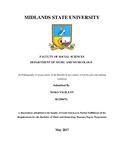Please use this identifier to cite or link to this item:
https://cris.library.msu.ac.zw//handle/11408/2803| Title: | An Ethnography of setapa music of the Basotho in the context of holoba pula rain making ceremony | Authors: | Noko, Vigilant | Keywords: | Cultural erosion | Issue Date: | 2017 | Publisher: | Midlands State University | Abstract: | Cultural erosion is a cause of concern in all community in Africa. It is on this regard that I took interest to research on the Basotho community in Kafusi village in Gwanda South rural areas in Matabeleland South in Zimbabwe. The research is entitled “An ethnography of setapa music of the Basotho in the context of holoba pula rain making ceremony.” It was conducted qualitatively with aid of research instruments such as interview guides and observation guide. These were explored since there is limited literature on the subject. The sample was chosen purposively since I had a knowhow of where to find people who are likely to bring rightful information. The research was based on the age of elders for authentic data and hence the elderly people who have knowledge about holoba pula in pre-colonial era were the ones interviewed. Also the Basotho traditional healers were some of informants; these were regarded as culture bearers who still practice the ceremony. Kraal heads and headman were part of the research project enhancing its progress. Snowballing really worked in the ongoing of research and widened the population sample. Participant observation was used in the field to get a thick description and get rid of informants who would be suspicious of the reason beyond research. The setapa dance is seldom practiced except for the local artists who perform it out of context. The instruments for ntenela are: the kudu horn, the drum and leg wrestles and the props are spears, knobkerries civet cat and the brown tail. With holoba pula the dance is solemn with three drums leg wrestles, the black bison tail the snuff and the ostrich feathered hat. The songs for holoba pula are for rituals the performance includes the dragging of feet as to show that it is more sacrilegious and the dance venerates spirit medium. Only women beyond menopause may take part in beer brewing. The attire for holoba pula cannot be performed out of context and songs are sung particularly during rainy season only. Setapa music in the context of rain making is seldom practiced in its purity as it used to be. There is solid evidence found during the field that the terminology in the ceremony that precedes holoba pula known as ntenela ceremony was once called motlholo in pre-colonial era now the new coinage might be a result of modernization and hybridization of Shona Venda, Kalanga Sotho and Ndebele. Villagers are concerned about eroding culture saying that Christians no longer want to offer sorghum associating the act as evil. While on the other hand the ceremony is not perfected since people use transport to visit Njelele. Detergents are now used. All the cultural traits which are slowly dying out were stimuli for me to carry such a study. | URI: | http://hdl.handle.net/11408/2803 |
| Appears in Collections: | Bsc Music And Musicology Honours Degree |
Files in This Item:
| File | Description | Size | Format | |
|---|---|---|---|---|
| noko DISSERTATION.pdf | Full Text | 2.3 MB | Adobe PDF |  View/Open |
Page view(s)
374
checked on Feb 14, 2026
Download(s)
250
checked on Feb 14, 2026
Google ScholarTM
Check
Items in MSUIR are protected by copyright, with all rights reserved, unless otherwise indicated.



